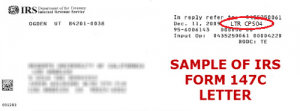
You have received a letter or notice from the IRS. Of the many questions going through your head, the most important one is likely, “what does my IRS notice number mean?” Whatever the case may be, if you received a letter or notice from the IRS it is most likely one of the following reasons:

Since opening the letter you have probably been experiencing a good amount of anxiety, but try not to get yourself too worked up. Your letter contains very important information, so the best thing you can do is read the whole letter carefully and then reply to it as soon as possible.
Be careful, It is likely that your IRS letter or notice requires a response by a specific date.
Complying with this deadline is in your best interest. Especially if you would like to minimize any additional interest and penalty charges, or to retain your right to appeal if you do not agree with the information.
Your IRS letter or notice number corresponds to the particular type of notice you were sent, so figuring out what your number means is easier than you may have thought.
First, if you do not already know your letter or notice number, it can be found on either the top or bottom right-hand corner of the letter. “LTR CP504”” is the notice number on the sample letter below.

In the following section, we have provided a list of the most common letter numbers and a summary of what each means. However, if yours is not listed, there are two additional resources you can use to figure out what your IRS letter number means.
The people at the IRS have been nice enough to make a number reference table available to the public that explains each type of letter or notice by its number. We have included a reference table in our post The Complete Guide to IRS Notices that contains the information about each notice number and its meaning. Simply look up your number on the table to get the information.
Now that you understand your IRS notice and the reason you have received it, the next step you should take is to respond to it. Typically, once the IRS sends you a notice you have a short window to respond. Whatever you do, do not ignore it. It is very important to stay in good standing with the IRS, and a failure to comply with the agency’s instructions is a one-way ticket to their bad side.
Your notice will list specific instructions to follow. Some notices are simply minor issues that need to be corrected, so it’s ok to respond yourself if you agree with the correction and feel confident that you know all the facts. If the notice is very complex, or you do not agree with the notice, it is highly recommended to seek advice from a tax professional.
How do I deal with an IRS levy?
To prevent collection action you must reach an agreement with the IRS on what to do about your assessed debt. If you do not have an agreement, you may be open to enforced collections. If your account has been levied, you have 21 days to seek a release.
How do I check to see if I owe the IRS money?
If you are an individual taxpayer, the IRS’ website has an online tool you can register for to check your balance. You can also find out how much you owe by filling out and submitting IRS form 4506-T (request for a transcript of the tax return). You can also call the IRS directly at (800)-829-7650.
Can the IRS take my non-profit status?
The answer is yes. It is just as easy to lose your non-profit status as it was to gain it. The IRS takes away the tax-exempt status from over 100 organizations every year.
![]()
This notice informs you a federal tax lien has been filed. This notice secures the federal government’s interest in your IRS tax debt. This is a public document. Other potential creditors and the public will not be aware that you owe money to the IRS. This will affect your credit and your ability to borrow and function as a business.